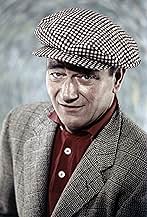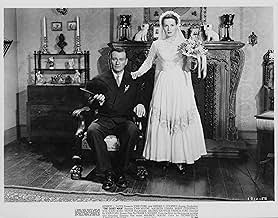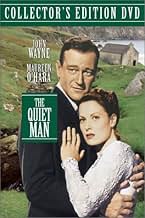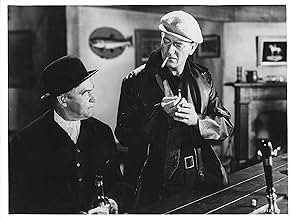IMDb रेटिंग
7.7/10
45 हज़ार
आपकी रेटिंग
अपनी भाषा में प्लॉट जोड़ेंA retired American boxer returns to the village of his birth in 1920s Ireland, where he falls for a spirited redhead whose brother is contemptuous of their union.A retired American boxer returns to the village of his birth in 1920s Ireland, where he falls for a spirited redhead whose brother is contemptuous of their union.A retired American boxer returns to the village of his birth in 1920s Ireland, where he falls for a spirited redhead whose brother is contemptuous of their union.
- निर्देशक
- लेखक
- स्टार
- 2 ऑस्कर जीते
- 15 जीत और कुल 10 नामांकन
Charles B. Fitzsimons
- Hugh Forbes
- (as CHARLES fitzSIMONS)
James O'Hara
- Father Paul
- (as James Lilburn)
Sean McClory
- Owen Glynn
- (as Sean McGlory)
Jack MacGowran
- Ignatius Feeney
- (as Jack McGowran)
फ़ीचर्ड समीक्षाएं
The Quiet Man is a wonderfully layered and at times hilariously ironic portrayal of Ireland as seen by an American.
For those who doubt the film's sense of irony, just re-watch the scene where Sean (John Wayne) paints the door of his cottage. The Vicar's wife remarks on its beauty and in a deadpan manner suggests "only an American would have thought of Emerald Green". Only an American (or a foreigner), is the implication, would think that the picturebook Ireland they are seeing in this film is a realistic portrayal of a lived experience of the country. An Irish person would have painted the door red, she says. It weathers better that way.
The film takes ideas of Irishness and exaggerates them to brilliant and comic effect. The drinking Mickaleen, the patriarchal rule, the idyllic countryside. But beneath the Oirish exterior is a sharp intelligence and a subversion of what the film at first glance seems to suggest.
Beneath the idyllic countryside are elemental forces that are waiting to be disturbed, as we see in the two scenes where Sean and Mary-kate kiss. Storm clouds fill the sky and the wind whips about them. The countryside which previously seemed so welcoming is now tempestuous and threatening. Theirs are passions which do not fit in the comic book world which we have previously seen. Yet they exist.
The portrayal of women, and particularly Sean's treatment of Mary-Kate when he drags her through the field is not so oppressive as it might seem. Remember that it is her who insists on receiving her dowry, who equates her possessions to her worth. It is she who forces Sean to act the way he does and fight Will Danaher. She indoctrinates him into her society by threatening to leave him. She withholds the marital bed. Sean eventually becomes the man she wants him to be.
In short this is a portrayal of Irish, or more importantly, rural life that is very much from the point of view of the outsider. Of the city folk. Yet it always acknowledges that and has great fun playing with its stereotypes. Its funny, its romantic, it appeals to the part of us that yearns to live a simple life away from the complex world, much as we know that life does not exist. Enjoy it!
For those who doubt the film's sense of irony, just re-watch the scene where Sean (John Wayne) paints the door of his cottage. The Vicar's wife remarks on its beauty and in a deadpan manner suggests "only an American would have thought of Emerald Green". Only an American (or a foreigner), is the implication, would think that the picturebook Ireland they are seeing in this film is a realistic portrayal of a lived experience of the country. An Irish person would have painted the door red, she says. It weathers better that way.
The film takes ideas of Irishness and exaggerates them to brilliant and comic effect. The drinking Mickaleen, the patriarchal rule, the idyllic countryside. But beneath the Oirish exterior is a sharp intelligence and a subversion of what the film at first glance seems to suggest.
Beneath the idyllic countryside are elemental forces that are waiting to be disturbed, as we see in the two scenes where Sean and Mary-kate kiss. Storm clouds fill the sky and the wind whips about them. The countryside which previously seemed so welcoming is now tempestuous and threatening. Theirs are passions which do not fit in the comic book world which we have previously seen. Yet they exist.
The portrayal of women, and particularly Sean's treatment of Mary-Kate when he drags her through the field is not so oppressive as it might seem. Remember that it is her who insists on receiving her dowry, who equates her possessions to her worth. It is she who forces Sean to act the way he does and fight Will Danaher. She indoctrinates him into her society by threatening to leave him. She withholds the marital bed. Sean eventually becomes the man she wants him to be.
In short this is a portrayal of Irish, or more importantly, rural life that is very much from the point of view of the outsider. Of the city folk. Yet it always acknowledges that and has great fun playing with its stereotypes. Its funny, its romantic, it appeals to the part of us that yearns to live a simple life away from the complex world, much as we know that life does not exist. Enjoy it!
10jhclues
The lush and beautiful countryside of Ireland provides the setting for this engaging tale of an Irishman, raised in America, going back home to escape a past he'd just as soon forget. In `The Quiet Man,' director John Ford returns to his own roots, going on location to tell the story of Sean Thornton (John Wayne), a man troubled by an incident that changed his life, and now doing what he can to forget about it and just move on. And toward that end, Sean travels to the place he knows so well from the stories told him by his mother, to Innisfree, intending to buy the cottage in which he was born, White O'Morn, where he can make a fresh start and build a new life for himself. There's a problem, however; the land and the cottage is owned by the widow Sarah Tillane (Mildred Natwick), and borders the estate of one Red Will Danaher (Victor McLaglen), who not only fancies the widow herself, but wants to buy her land. Squire Danaher (as he's known) is not the only one Sean must deal with, though, as other matters arise upon his arrival in the small hamlet of his birth. And her name is Mary Kate (Maureen O'Hara)-- who just happens to be Squire Danaher's sister. But Danaher or no, it makes no difference to Sean, who as soon as he lays eyes on Mary Kate determines to make her his wife.
Sean soon learns that in Ireland, however, such things are pursued quite differently than in America. To win the hand of Mary Kate he must employ the services of Michaleen Flynn (Barry Fitzgerald) a kind of matchmaker/chaperone/marriage broker, who will help him secure the consent of Squire Danaher, without which the marriage cannot and will not take place. So Sean has no choice but to acquiesce to the local traditions and customs, and Michaleen forthwith commences the appropriate overtures. In the meantime, he awaits the decision of the widow Tillane as to the purchase of White O'Morn, which he is determined to have at any cost.
John Ford directed more than 140 motion pictures, going back to the days of silent films, and his favorite star, with whom he worked in at least a dozen of his feature films, was John Wayne. And when you think of the John Ford/John Wayne collaborations, it's the Western that instantly comes to mind: `Stagecoach,' `She Wore A Yellow Ribbon,' `Fort Apache,' `Rio Grande' or `The Searchers,' (to name a few). Yet, `The Quiet Man' is perhaps their most memorable effort, and remains a favorite among fans to this day. Ford (who received an Oscar for Best Director for it) presents the story on a very personal level, and in Sean and Mary Kate gives the audience characters to whom they can relate; and it's that personal connection he affords the viewer that may suggest the main reason behind this particular film's popularity. That, plus the fact that at the core of this story there is an honesty and genuine sincerity that rings so true-to-life. Ford also successfully captures the essence of all that is good and positive about Ireland, from the richness of all of his characters to the lavish cinematography that brings the country so vividly to life. It's quite simply a wonderful, uplifting film, impeccably crafted and delivered by Ford and his superb cast.
Too often, John Wayne's work gets a bad rap; no matter what role he takes on, you're liable to hear `John Wayne is always John Wayne, the only difference is the character's name.' And, as he proves with his portrayal of Sean Thornton, it's not only a false statement, it's so unfair to an actor who brought so much to so many, in his craft as well as in his personal life. The Oscar he finally received for 1969's `True Grit' was way overdue, especially when you consider his performances in such films as `The Searchers,' `Red River' and, of course, this one. Is he the best actor of all time? Of course not; but he is good at what he does, much better than he is usually given credit for. And he (and his films) can always-- always-- be counted on to provide good, solid entertainment. Together, he and Ford have provided some of the most memorable moments in the history of the movies, and his pairing with Maureen O'Hara was a stroke of genius. There's real chemistry between them, which enables them to play so well off of one another. They made five films together between 1950 (`Rio Grande') and 1971 (`Big Jake'), and there is always that spark of magic between them, but never better than in this film.
A gifted actor, Maureen O'Hara is also, without question, one of the most beautiful women ever to grace the silver screen. It's easy to understand how Sean Thornton can fall instantly in love with her when he first sees her walking through the fields of Innisfree. It's entirely believable. And when you get to know the woman behind the beauty-- who Mary Kate is down deep-- it's even more understandable. Perfectly cast, O'Hara, like Ford, returned to her roots to make this film (she was born in Milltown, Ireland, near Dublin), and apparently it agreed with her, because her performance is nothing less than natural and inspired. Mary Kate Danaher, in fact, is arguably one of her-- if not `the'-- most memorable roles of her career.
The supporting cast, topped by Fitzgerald (who is absolutely unforgettable as Michaleen) also includes Ward Bond (Father Lonergan), Francis Ford (Dan Tobin), Arthur Shields (Reverend Playfair) and Jack MacGowran (Feeney). A delightful and endearing motion picture, `The Quiet Man' is, of all of John Ford's achievements, one of his best. And Sean, Mary Kate, Michaleen and all the people of Innisfree are ones you'll remember and want to visit again. It's the magic of the movies. I rate this one 10/10.
Sean soon learns that in Ireland, however, such things are pursued quite differently than in America. To win the hand of Mary Kate he must employ the services of Michaleen Flynn (Barry Fitzgerald) a kind of matchmaker/chaperone/marriage broker, who will help him secure the consent of Squire Danaher, without which the marriage cannot and will not take place. So Sean has no choice but to acquiesce to the local traditions and customs, and Michaleen forthwith commences the appropriate overtures. In the meantime, he awaits the decision of the widow Tillane as to the purchase of White O'Morn, which he is determined to have at any cost.
John Ford directed more than 140 motion pictures, going back to the days of silent films, and his favorite star, with whom he worked in at least a dozen of his feature films, was John Wayne. And when you think of the John Ford/John Wayne collaborations, it's the Western that instantly comes to mind: `Stagecoach,' `She Wore A Yellow Ribbon,' `Fort Apache,' `Rio Grande' or `The Searchers,' (to name a few). Yet, `The Quiet Man' is perhaps their most memorable effort, and remains a favorite among fans to this day. Ford (who received an Oscar for Best Director for it) presents the story on a very personal level, and in Sean and Mary Kate gives the audience characters to whom they can relate; and it's that personal connection he affords the viewer that may suggest the main reason behind this particular film's popularity. That, plus the fact that at the core of this story there is an honesty and genuine sincerity that rings so true-to-life. Ford also successfully captures the essence of all that is good and positive about Ireland, from the richness of all of his characters to the lavish cinematography that brings the country so vividly to life. It's quite simply a wonderful, uplifting film, impeccably crafted and delivered by Ford and his superb cast.
Too often, John Wayne's work gets a bad rap; no matter what role he takes on, you're liable to hear `John Wayne is always John Wayne, the only difference is the character's name.' And, as he proves with his portrayal of Sean Thornton, it's not only a false statement, it's so unfair to an actor who brought so much to so many, in his craft as well as in his personal life. The Oscar he finally received for 1969's `True Grit' was way overdue, especially when you consider his performances in such films as `The Searchers,' `Red River' and, of course, this one. Is he the best actor of all time? Of course not; but he is good at what he does, much better than he is usually given credit for. And he (and his films) can always-- always-- be counted on to provide good, solid entertainment. Together, he and Ford have provided some of the most memorable moments in the history of the movies, and his pairing with Maureen O'Hara was a stroke of genius. There's real chemistry between them, which enables them to play so well off of one another. They made five films together between 1950 (`Rio Grande') and 1971 (`Big Jake'), and there is always that spark of magic between them, but never better than in this film.
A gifted actor, Maureen O'Hara is also, without question, one of the most beautiful women ever to grace the silver screen. It's easy to understand how Sean Thornton can fall instantly in love with her when he first sees her walking through the fields of Innisfree. It's entirely believable. And when you get to know the woman behind the beauty-- who Mary Kate is down deep-- it's even more understandable. Perfectly cast, O'Hara, like Ford, returned to her roots to make this film (she was born in Milltown, Ireland, near Dublin), and apparently it agreed with her, because her performance is nothing less than natural and inspired. Mary Kate Danaher, in fact, is arguably one of her-- if not `the'-- most memorable roles of her career.
The supporting cast, topped by Fitzgerald (who is absolutely unforgettable as Michaleen) also includes Ward Bond (Father Lonergan), Francis Ford (Dan Tobin), Arthur Shields (Reverend Playfair) and Jack MacGowran (Feeney). A delightful and endearing motion picture, `The Quiet Man' is, of all of John Ford's achievements, one of his best. And Sean, Mary Kate, Michaleen and all the people of Innisfree are ones you'll remember and want to visit again. It's the magic of the movies. I rate this one 10/10.
10huttfam5
What's not to like about this picture? A classic directed by the legendary John Ford. John Wayne and Maureen O'Hara light up the screen. Wayne's performance is brilliant, but what really stands out is that he is playing a regular guy with real feelings and emotions--no army uniforms, no indians to fight, no cavalry coming to the rescue--just a great performance. The supporting cast is unmatched--including great performances by Victor McLaglen, Barry Fitzgerald and Ward Bond. Look closely for Ken Curtis (Festus, from Gunsmoke) in an uncredited role. The scenery is absolutly breathtaking--it makes me want to go home to Ireland--and I'm not even Irish. To top it off The Quiet Man has the greatest fist fight ever captured on film. This is one of my two favorite John Wayne movies. The Duke should have gotten an Oscar for this one. Movie viewers won't be disapointed by this one.
One of the best directed by John Ford. An emotional, humorous look at an American, played by John Wayne, going back to his native Ireland and trying to fit in with the present culture. Sensational scenery and the grand music by Victor Young support this classic among classics. Breezy and rowdy. Too beautiful to turn your back on. A great illustration of romance. The interaction between Wayne and Maureen O'Hara is magical and hard to beat.
Other classic performances are turned in by Victor McLaglen, Ward Bond and Barry Fitzgerald.
Other classic performances are turned in by Victor McLaglen, Ward Bond and Barry Fitzgerald.
I like The Quiet Man so much that it features in my top three favourite films. This incidentally is alongside quite disparate films as Blade Runner and The Shawshank Redemption.
This is nothing to do with direction, acting or even location but simply because it feels so good!
Yes it is a simple story but it's amusing, very easy to watch and leaves you with a warm glow and a smile. Also the building of the "diddly diddly music" approaching the fight sequence is a delight.
That's all I need from a film that does not pretend to be anything more than a story.
This is nothing to do with direction, acting or even location but simply because it feels so good!
Yes it is a simple story but it's amusing, very easy to watch and leaves you with a warm glow and a smile. Also the building of the "diddly diddly music" approaching the fight sequence is a delight.
That's all I need from a film that does not pretend to be anything more than a story.
क्या आपको पता है
- ट्रिवियाAt the film's conclusion, after the credits, we see Kate and Sean standing in their garden waving good-bye. Maureen O'Hara turns to John Wayne and whispers something in his ear, evoking a priceless reaction from Wayne. What was said was known only to O'Hara, Wayne and director John Ford. In exchange for saying this unscripted bit of text, O'Hara insisted that the exact line never be disclosed by any involved parties. In her memoirs she says that she refused to say the line at first as she "couldn't possibly say that to Duke", but Ford insisted, claiming he needed a genuine shock reaction from Wayne. The line remains a mystery to this day.
- गूफ़Before Sean enters Mary Kate's home to ask her brother's permission to court her, the flowers he's carrying are very sad looking. After he enters the house, they change into a nice, full, colorful bouquet.
- भाव
Mary Kate Danaher: Could you use a little water in your whiskey?
Michaleen Flynn: When I drink whiskey, I drink whiskey; and when I drink water, I drink water.
- कनेक्शनFeatured in Directed by John Ford (1971)
- साउंडट्रैकThe Wild Colonial Boy
(uncredited)
Traditional
Adapted by Sean O'Casey and Dennis O'Casey
Performed by John Wayne, Ken Curtis, and Francis Ford and others in the Pub
Reprised a cappella by Wayne and Victor McLaglen
टॉप पसंद
रेटिंग देने के लिए साइन-इन करें और वैयक्तिकृत सुझावों के लिए वॉचलिस्ट करें
विवरण
- रिलीज़ की तारीख़
- कंट्री ऑफ़ ओरिजिन
- भाषाएं
- इस रूप में भी जाना जाता है
- The Man Who Didn't Talk Too Much
- फ़िल्माने की जगहें
- Cong, County Mayo, आयरलैंड(Inisfree)
- उत्पादन कंपनी
- IMDbPro पर और कंपनी क्रेडिट देखें
बॉक्स ऑफ़िस
- बजट
- $17,50,000(अनुमानित)
- चलने की अवधि
- 2 घं 9 मि(129 min)
- पक्ष अनुपात
- 1.37 : 1
इस पेज में योगदान दें
किसी बदलाव का सुझाव दें या अनुपलब्ध कॉन्टेंट जोड़ें

























